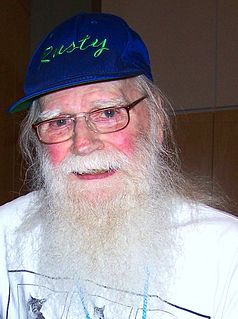
Damien Francis Broderick is an Australian science fiction and popular science writer and editor of some 74 books. His science fiction novel The Dreaming Dragons (1980) introduced the trope of the generation time machine, his The Judas Mandala (1982) contains the first appearance of the term "virtual reality" in science fiction, and his 1997 popular science book The Spike was the first to investigate the technological singularity in detail.

Science fiction conventions are gatherings of fans of the speculative fiction genre, science fiction. Historically, science fiction conventions had focused primarily on literature, but the purview of many extends to such other avenues of expression as films, television, comics, animation, and games. The format can vary but will tend to have a few similar features such as a guest of honour, discussion panels, readings and large special events such as opening/closing ceremonies and some form of party or entertainment. Science fiction conventions started off primarily in the UK and US but have now spread further and several countries have their own individual conventions as well as playing host to rotating international conventions.

Esther Mona Friesner-Stutzman, née Friesner is an American science fiction and fantasy author. She is also a poet and playwright. She is best known for her humorous style of writing, both in the titles and the works themselves. This humor allows her to discuss with broader audiences about issues like gender equality and social justice.
Donald Henry Tuck was an Australian bibliographer of science fiction, fantasy and weird fiction. His works were "among the most extensive produced since the pioneering work of Everett F. Bleiler."
Robert Duncan Drewe is an Australian novelist, non-fiction and short story writer.
SwanCon is a science fiction convention held in Perth, Western Australia. It is Australia's longest-running science fiction convention, and probably the longest-running in the southern hemisphere.

Denis Gifford was a British writer, broadcaster, journalist, comic artist and historian of film, comics, television and radio. In his lengthy career, he wrote and drew for British comics; wrote more than fifty books on the creators, performers, characters and history of popular media; devised, compiled and contributed to popular programmes for radio and television; and directed several short films. Gifford was also a major comics collector, owning what was perhaps the largest collection of British comics in the world.
The Ditmar Award is Australia's oldest and best-known science fiction, fantasy and horror award, presented annually since 1969, usually at the Australian "Natcon". The historical nominations and results of the Award follow.

Frederick Walter Patten was an American writer and historian known for his work in the science fiction, fantasy, anime, manga, and furry fandoms, where he gained great distinction through a substantial contribution to both print and online books, magazines, and other media.

Terence William (Terry) Dowling, is an Australian writer and journalist. He writes primarily speculative fiction though he considers himself an "imagier" – one who imagines, a term which liberates his writing from the constraints of specific genres. He has been called "among the best-loved local writers and most-awarded in and out of Australia, a writer who stubbornly hews his own path ."
The Australian National Science Fiction Convention or Natcon is an annual science fiction convention. Each convention is run by a different committee unaffiliated with any national fannish body. Bids for running the Natcon are voted on by attendees at the Natcon two years in advance. These votes are held at a Business Meeting organised by the convention committee, and held at the convention, in practice much of the organisation of the meeting is done by a standing committee selected by the prior meeting.
Lee John Harding is an Australian freelance photographer, who became a writer of science fiction novels and short stories.

James LeRoy "Rusty" Hevelin was a science fiction fan, fanzine publisher, collector and huckster.
The Atlanta Radio Theatre Company. (ARTC) is a 501(c)(3) non-profit organization dedicated to preserving, promoting, performing, and educating people about the art of audio theatre.
The Chandler Award is presented by the Australian Science Fiction Foundation for "Outstanding Achievement in Australian Science Fiction".

The Eaton Collection of Science Fiction and Fantasy, formerly known as the J. Lloyd Eaton Collection of Science Fiction, Fantasy, Horror, and Utopian Literature, is "the largest publicly accessible collection of science fiction, fantasy, horror and utopian and dystopian literature in the world". It is housed in Special Collections and Archives of the UCR Libraries at the University of California, Riverside. It consists of more than 300,000 items, including hardcover and paperback books, SF fanzines, film and visual material, and comic books, including manga and anime, as well as a variety of archival materials.

Richard H.E. Smith II is a Chicago, Illinois- and Milwaukee, Wisconsin-based software engineer, computer consultant and a science fiction fanzine publisher.
The Ditmar Award has been awarded annually since 1969 at the Australian National Science Fiction Convention to recognise achievement in Australian science fiction and science fiction fandom. The award is similar to the Hugo Award but on a national rather than international scale.
Ronald Keith Chatto was an Australian comic book artist and writer. He was the first Australian illustrator to draw a full-length episode of The Phantom comic.

Atlas Publications was an Australian publishing company which operated from 1948 until 1958 and was based in Clifton Hill, a suburb of Melbourne. It published magazines and popular fiction, and the genre for which it was best known, adventure comics. It had no relation to the American company Atlas Comics which was active in the same period.








